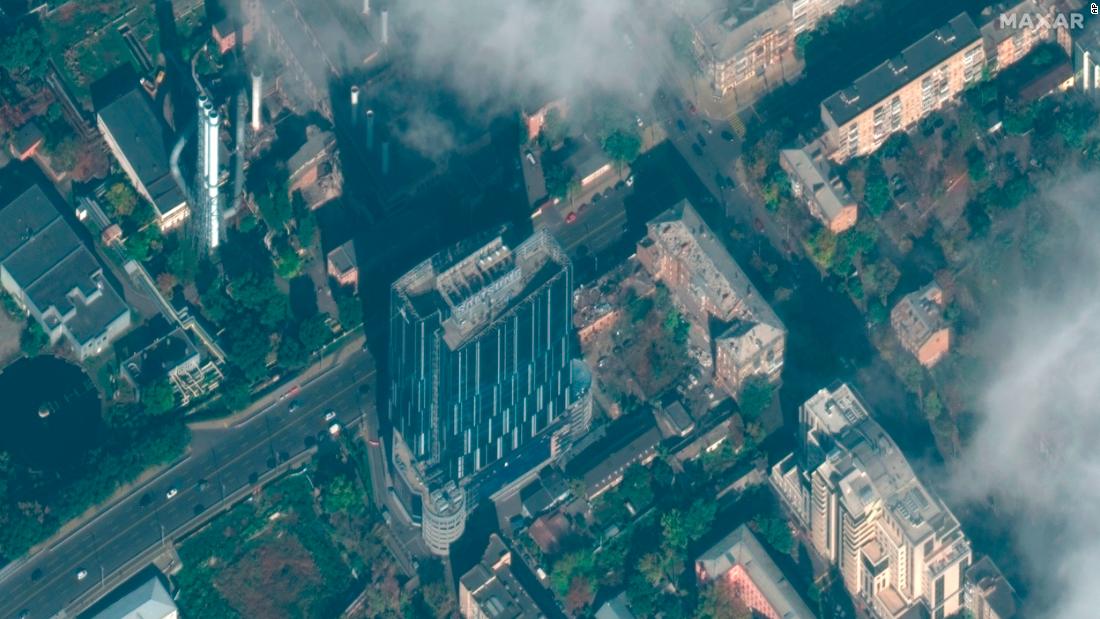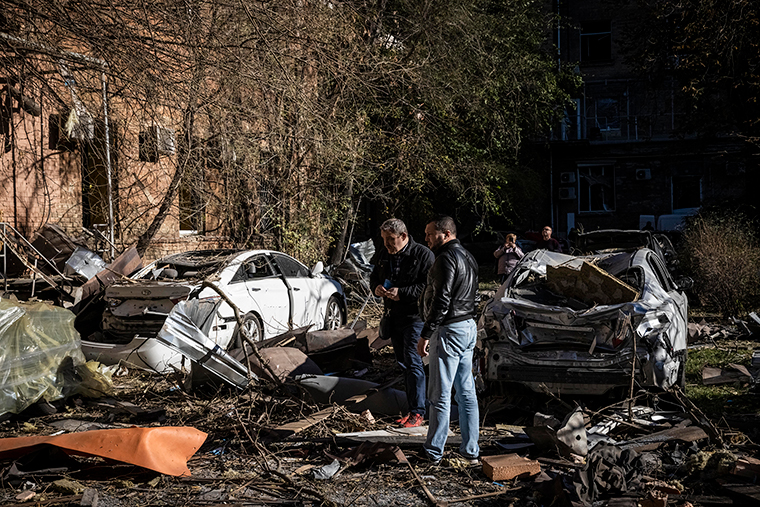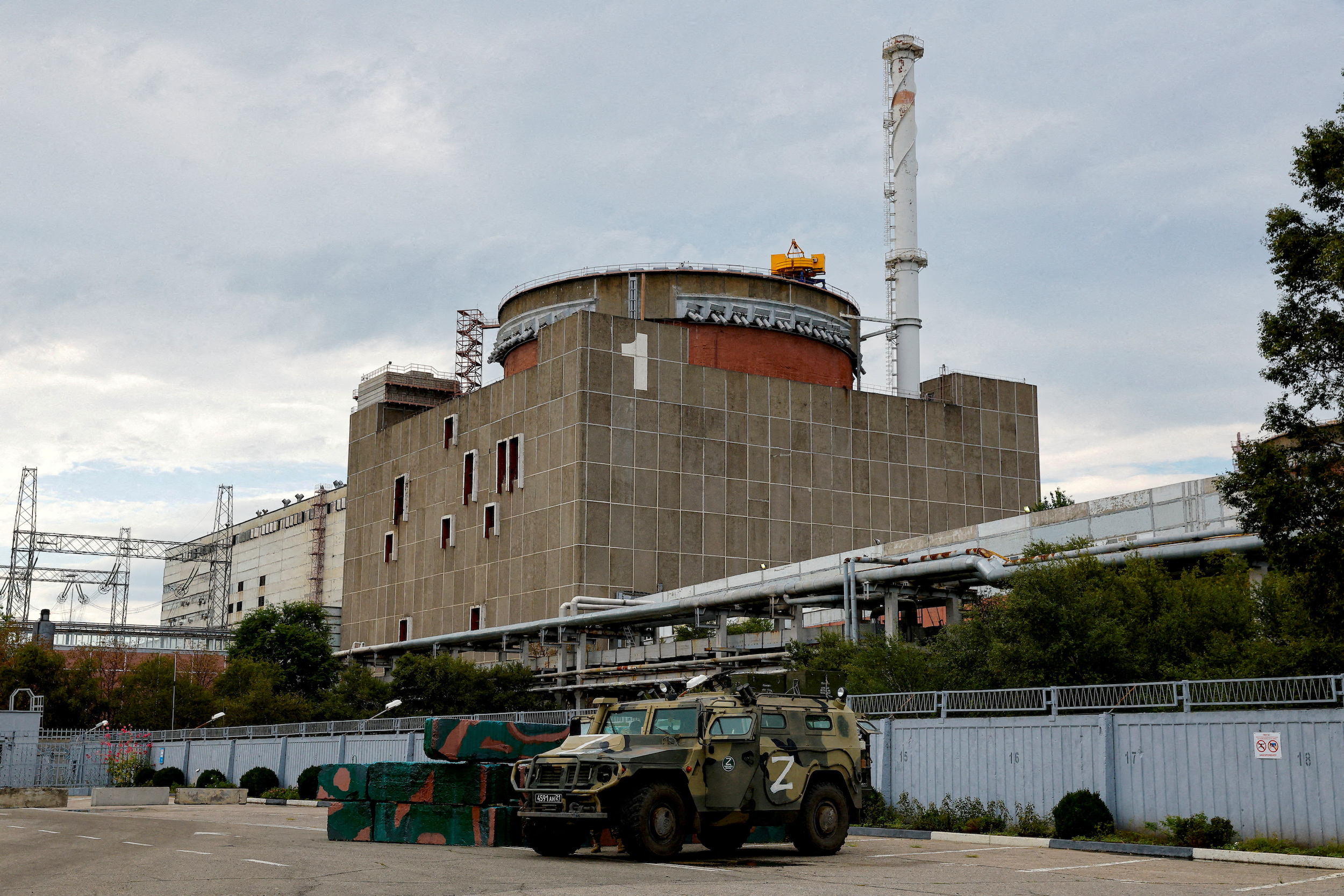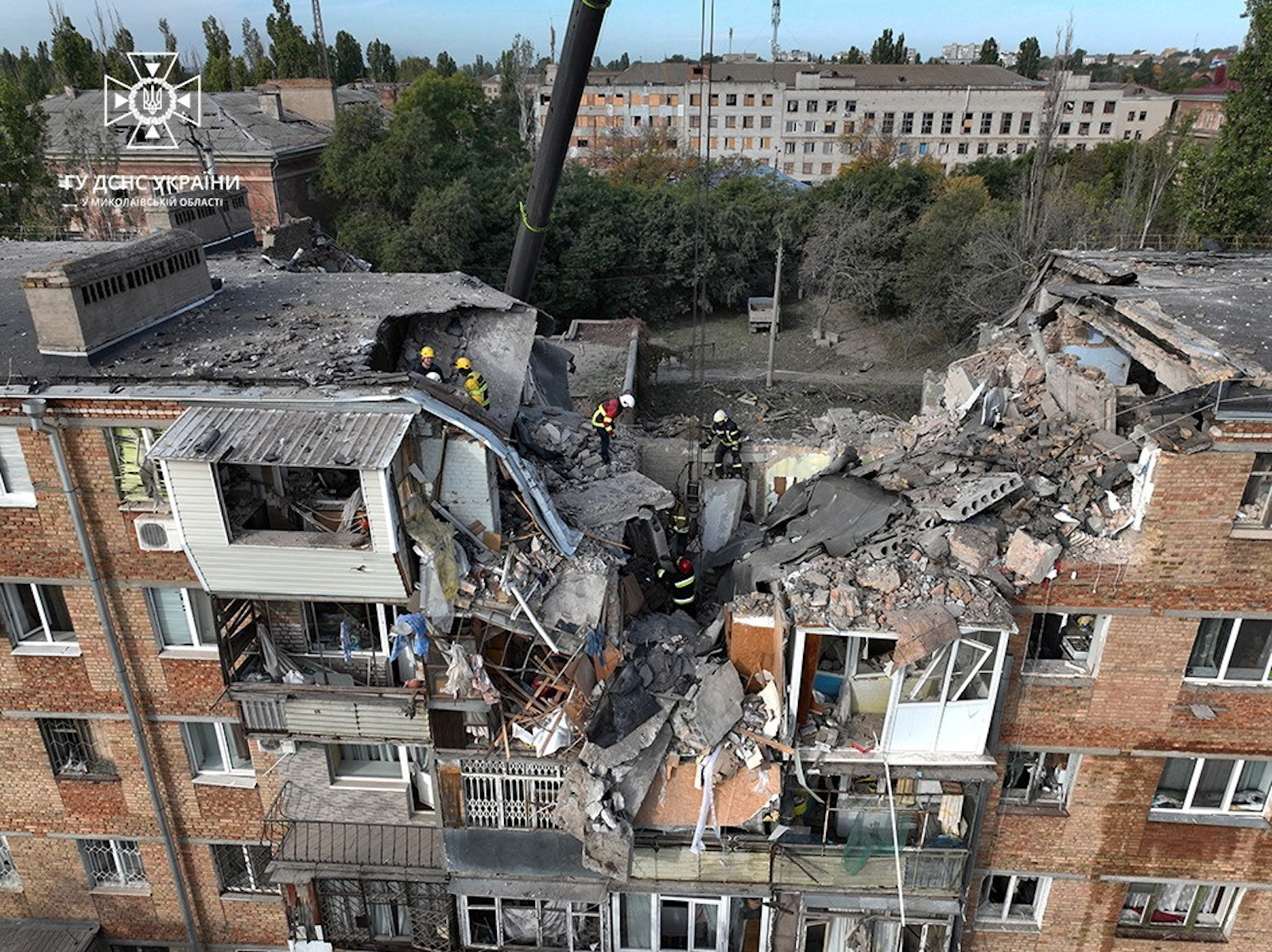
It’s nighttime in Kyiv. Here’s what you need to know
Russia’s strikes on civilian targets continued Thursday, including a “kamikaze” drone attack in the Kyiv region and shelling of residential buildings in the southern city of Mykolaiv.
Ukraine’s President Volodymyr Zelensky called on NATO defense ministers for more air defense, declaring Kyiv only has about 10% of what it needs to combat Moscow’s blitz.
In response, NATO Secretary General Jens Stoltenberg said the alliance is set to deliver counter-drone equipment to Ukraine following Thursday’s meetings of NATO defense ministers in Brussels.
Here are the latest headlines:
- Russian-backed leader of Kherson calls for evacuation of civilians: The head of the Russian-backed administration in the southern Ukrainian region of Kherson appealed to the Kremlin to organize an evacuation of civilians in the face of a Ukrainian offensive. In response, Deputy Prime Minister Marat Khusnullin told RIA Novosti that Moscow would help residents move to other regions.
- Russia and Ukraine trade accusations about a damaged residential building in Belgorod: Moscow and Kyiv are blaming each other for the damage inflicted on a residential building in the Russian city of Belgorod, near the border with Ukraine. Russian officials blamed the Ukrainian Armed Forces, although Ukrainian presidential adviser Mykhailo Podolyak said Russia launched a missile toward Kharkiv and missed its target.
- Progress made toward establishing safety zone around Zaporizhzhia power plant, IAEA chief says: IAEA Director General Rafael Grossi shared photographs on Twitter of a meeting with Ukrainian Foreign Minister Dmytro Kuleba in a Kyiv bunker on Thursday, saying progress was being made toward establishing a protection zone around what is Europe’s largest nuclear power plant. Later on Thursday, Grossi told reporters: “I believe we are making good progress.”
- 20 Russian soldiers released from Ukrainian captivity, Moscow says: Twenty captured Russian soldiers were returned from Ukrainian captivity on Thursday as a result of a “negotiation process” with Kyiv, the Russian defense ministry said in a statement. The statement did not mention the terms of the negotiation deal with Kyiv for the release of the soldiers.
- Putin proposes “gas hub” plan to Turkey’s Erdoğan: Russian President Vladimir Putin suggested a “gas hub” plan to Turkish President Recep Tayyip Erdoğan on Thursday. “If there is interest from Turkey and our potential buyers from other countries, we could consider the possibility of building another gas pipeline system and creating a gas hub in Turkey to sell to other countries — to third countries, primarily, of course; the European ones, if they are interested,” Putin said on the sidelines of the Conference on Interaction and Confidence-Building Measures in Asia summit in Astana in Kazakhstan.
#Catch Up##
Analysis: Russia is bruised as winter approaches. Can Ukraine land another blow?
From CNN’S Rob Picheta

The relative calm in Ukrainian cities far from the country’s battlefields was shattered by two painfully familiar sounds this week: the ominous ring of the air raid sirens, and the eruptions of Russian attacks.
A wave of missiles, rockets and drones has struck dozens of locations across Ukraine since Monday, according to officials, targeting civilian infrastructure in several major cities, including Kyiv, located hundreds of miles from the front lines in the east and south.
The wide bombardment echoed the early days of Russia’s scattershot initial invasion in February, but also underlined that the conflict in Ukraine, which for months appeared to be descending into a slow and painful grind in the Donbas, has erupted once again as winter nears.
Not for the first time, the war is teetering toward an unpredictable new phase.
“This is now the third, fourth, possibly fifth different war that we’ve been observing,” said Keir Giles, a senior consulting fellow at Chatham House’s Russia and Eurasia Programme.
The strikes followed weeks of Ukrainian ground gains and began two days after a huge explosion damaged the Kerch bridge, the only crossing between the annexed Crimean peninsula and Russia. That blast, which was used by the Kremlin as a justification for Monday’s onslaught, bruised the Russian psyche and handed Ukraine a significant strategic boost.
With the cold months nearing and likely bringing a slowdown in ground combat, experts say the next weeks of the war are now expected to be vital, and another potential spike in intensity looms over Ukraine as each side seeks to strike another blow.
“What seemed a distant prospect for anything that could be convincingly described as a Ukraine victory is now very much more plausible,” Giles said. “The response from Russia is likely to escalate further.”
To read more, click here:
Ukraine demands Red Cross mission to Russian POW camp where prisoners died in shelling
From CNN’s Tim Lister
Ukraine is demanding that the International Committee of the Red Cross immediately send a delegation to the Russian prisoner of war camp at Olenivka in the Russian-occupied Donetsk region.
Andriy Yermak, the head of President Volodymyr Zelensky’s office, published the call for a mission on the administration’s website.
“At the end of July, as a result of terrorist shelling by the Russian occupiers, more than 50 defenders of Ukraine were killed” at the camp, Yermak told the Red Cross, according to the public message.
CNN recently investigated the camp’s shelling.
The Russian Defense Ministry said a Ukrainian HIMARS rocket attack was responsible for the strike. The CNN investigation, based on analysis of video and photographs from the scene, satellite imagery from before and after the attack and the work of forensic and weapons experts, concluded the Russian version of events was very likely a fabrication.
In the aftermath of the attack, the Russian Defense Ministry said it was ready for the Red Cross to visit the camp. But, despite repeated requests from the organization, no visit was ever arranged.
Yermak said the conditions under which Ukrainian prisoners are held, and what they face in places of detention in the Russian Federation and in the temporarily occupied territory of Ukraine, “is extremely important.”
“There are concentration camps again, and it is impossible to remain silent about this,” he said.
“Therefore, I call for the Red Cross mission with international media representatives to arrive in Ukraine no later than in three days, even if you do not receive confirmation from Russia by this time. And we are sure that Russia is not interested in the truth being known.”
It’s unclear how any mission to Olenivka could happen without Russian consent, as the detention center is in Russian-occupied territory.
Nuclear watchdog chief says progress made toward establishing safety zone around Zaporizhzhia power plant
From CNN’s Alex Hardie

The head of the UN’s nuclear watchdog agency has said that progress is being made toward establishing a safety zone around the Russian-occupied Zaporizhzhia nuclear plant in Ukraine.
IAEA Director General Rafael Grossi shared photographs on Twitter of a meeting with Ukrainian Foreign Minister Dmytro Kuleba in a Kyiv bunker on Thursday, saying “we are making progress” towards establishing a protection zone around what is Europe’s largest nuclear power plant.
Later on Thursday, Grossi told reporters in Kyiv that “the work continues, and I believe we are making good progress.”
However, he added that the “situation continues to be extremely fragile, extremely precarious.”
In a tweet, Kuleba said he had “reiterated that Russia must withdraw from the ZNPP to ensure its nuclear safety and security, immediately stop abductions and intimidation of the Ukrainian personnel,” when he met with Grossi Thursday.
Boy rescued from rubble of Mykolaiv building dies
From Julia Kesaieva

An 11-year old boy who was rescued from the wreckage of a building in Mykolaiv shelled by Russian forces has died in hospital, according to Ukrainian officials.
Vitalii Kim, head of Mykolaiv region military administration, said the boy, named Artem, had been brought to the regional hospital and went into cardiac arrest.
Ukraine’s State Emergency Service said the boy had been trapped under the rubble of a five-story building for more than six hours overnight before finally being rescued early Thursday morning.
“All the time, he was bravely holding on, listening to all the advice of rescuers who were trying to support him in every possible way, while carrying out emergency work,” the Service said.
“I have no words,” Kim said.
Russian use of nuclear weapons would lead to its forces being annihilated, EU foreign policy chief says
From CNN’s Tim Lister
Any use of nuclear weapons by Russia against Ukraine would lead to its forces being annihilated, the EU’s foreign policy chief Josep Borrell said Thursday.
“Putin is saying he is not bluffing. Well, he cannot afford to be bluffing, and it has to be clear that the people supporting Ukraine and the European Union and its members, and the United States and NATO are not bluffing either,” Borrell said in Bruges, Belgium.
“Any nuclear attack against Ukraine will bring a response, not a nuclear response but such a powerful response from the military side that the Russian army will be annihilated,” he added.
Earlier, NATO’s Secretary Jens Stoltenberg said the circumstances in which the military alliance would use nuclear weapons are “extremely remote.”
“We will not go into how exactly we will respond but, of course, this will fundamentally change the nature of the conflict. It will mean that a very important line has been crossed. Even any use of a smaller nuclear weapon will be a very serious thing, changing the nature of the war in Ukraine,” Stoltenberg said.
Russia will help evacuate residents from Kherson, government official says
From CNN’s Katharina Krebs
The Russian government will help residents of the Kherson region evacuate to other regions of the country, according to Russian Deputy Prime Minister Marat Khusnullin who was quoted by the Russian state media RIA Novosti.
“In connection with the appeal of the head of the Kherson region of the Russian Federation, Vladimir Saldo, the government decided to organize assistance for the departure of residents of the region to other regions of the country,” said Khusnullin, as quoted by RIA.
Earlier Thursday, Saldo appealed to the Kremlin to organize an evacuation of civilians in the face of an ongoing Ukrainian offensive.
However, Kirill Stremousov, the deputy head of Kherson region military administration, said in response that there would not be any evacuation.
Saldo’s request to “help organize the departure of residents of the Kherson region for temporary stay and rest in other regions of the Russian Federation is not a call for evacuation,” Stremousov said. “We urge the residents of the Kherson region to remain calm and to not panic. Nobody is going to withdraw Russian troops from the Kherson region.”
Ukrainian forces have been making gradual advances through Kherson, as well as striking critical infrastructure such as bridges and railways.
Kherson is one of four regions of Ukraine annexed by Russia last month.
Russia says 400 fighters with Ukraine’s Azov Regiment are in pre-trial detention centers
From CNN’s Katharina Krebs
Russian authorities said more than 400 fighters of the Ukrainian Azov Regiment have been taken to various pre-trial detention centers in Russia.
“In the period from the end of September to the present time, 402 nationalists of the Azov battalion have been taken to the territory of Russia and placed in specialized institutions in the territories of the Volgograd, Rostov, Belgorod and Voronezh regions,” the Russian Investigative Committee said Thursday.
The Azov Regiment, which is part of Ukraine’s National Guard, is classified as a terrorist organization in Russia. Its fighters were prominent in the defense of the Azovstal steel plant in Mariupol.
The committee claimed that its investigators — in cooperation with the Federal Security Service (FSB) and the Federal Penitentiary Service (FSIN) — are recording “new facts of ill-treatment of civilians by the Ukrainian military.”
Earlier this month, the acting head of the Azov Regiment, Nikita Nadtochy, said that about 2,500 service personnel from Mariupol remained in Russian captivity, among them about 700 “Azov” fighters.
That was after the return of 108 Azov fighters to Ukraine in a complex prisoner exchange in late September.